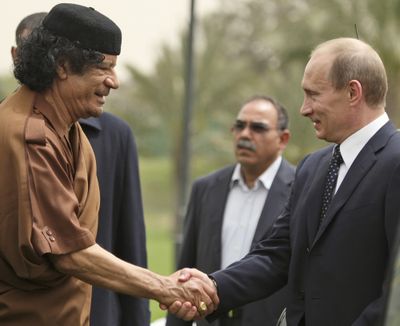Rice launches Mideast trip with Libya visit
Spokesman calls Gadhafi meeting a ‘historic stop’

WASHINGTON – Secretary of State Condoleezza Rice plans to visit Libya this week, part of a dramatic turnaround in U.S. relations with the former pariah nation. No U.S. secretary of state has visited Libya in more than a half-century.
Rice launches a four-nation tour of North Africa in Tripoli on Friday, meeting with Libyan leader Moammar Gadhafi and other top officials in what the State Department is calling a landmark trip that will symbolize the opening of a new era in ties between the United States and the oil-rich country.
“It’s a historic stop,” spokesman Sean McCormack said, noting that Rice will be the first secretary of state to visit Libya since John Foster Dulles in 1953 and the highest-ranking U.S. official to visit since then-Vice President Richard Nixon in 1957.
“In that period of time, we’ve had a man land on the moon, the Internet, the Berlin Wall fall, and we’ve had 10 U.S. presidents.”
Rice’s visit comes amid a surge in interest from U.S. firms, particularly in the energy sector, to do business in Libya, where European companies have had much greater access in recent years. Libya’s proven oil reserves are the ninth largest in the world – close to 39 billion barrels – and vast areas remain unexplored for new deposits.
The two countries are now working on a bilateral trade and investment pact to boost commerce that may be completed in time for Rice’s arrival, officials say.
Long deemed a state sponsor of terrorism and targeted by U.S. airstrikes in 1986, Libya began to redeem itself in 2003 when Gadhafi, who President Reagan once famously termed the “mad dog of the Middle East,” abandoned weapons of mass destruction programs, renounced terrorism and began moves to compensate the families of victims of Libyan-linked attacks.
After an initial settlement ran into trouble, a comprehensive package was approved last month and Libya is expected to begin soon paying hundreds of millions of dollars into a special fund that will distribute payments to the families of victims from the 1988 Pan Am 103 bombing over Lockerbie, Scotland and the 1986 bombing of the La Belle disco in Berlin.
All 269 passengers and crew, including 180 Americans, on board the Pan Am flight and 11 people on the ground were killed at Lockerbie.
David Welch, the top U.S. diplomat for the Middle East who negotiated the settlement with Libya, said Gadhafi’s change of course on nuclear, chemical and biological weapons and terrorism represented foreign policy “success” for the Bush administration, which now deals with Libya on issues from the situation in Darfur to Iran and the war on terror.
“This is a relationship that has had a troubled past, but now it is on a much firmer foundation,” Welch said. “He, as leader, has undertaken some decisions which have changed things and it’s important to recognize that.”
Welch said Rice intends to raise human rights concerns in Libya as well as in her other North African stops: Tunisia, Algeria and Morocco.